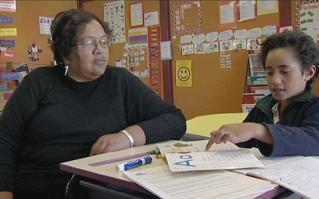Section navigation

In this clip, the principal shares his thinking about how a school can undertake a programme of change that stems from curriculum and pedagogy, and what the leader’s role is, especially in terms of promoting a school-whānau partnership. He acknowledges that the change from teachers focusing on content to focusing on students (and their learning) was a slow process which required time for review and reflection.
Questions / Things to think about / Activities
- What actions would we need to take to implement change in our school, to shift the focus from teaching topics/subjects to focusing on the students and their needs – as happened at Taihape Area School?
- In what ways does our leadership team actively take responsibility for Māori student achievement?
- What more could our school do to try to accommodate Māori students, rather than the Māori students always having to ‘fit’ our systems and processes?
- What evidence is there that shows what works for Māori students, in terms of school structures and transitions? (Pages 30-31 in Key evidence: Ka Hikitia may be helpful.) How can we apply this evidence to our school?)
- 'How are we responding to the requirement in the New Zealand Curriculum to make decisions about how to give effect to the national curriculum in ways that best address the particular needs, interests, and circumstances of the school’s students and community' (NZC p 37)?
- How can we apply the evidence that shows the effectiveness of using an inquiry approach with Māori students? (See p 21 in Key evidence: Ka Hikitia re ‘ako’ and inquiry learning.)
- What evidence is there that shows what works for Māori students in terms of expectations? (See Key evidence: Ka Hikitia pages pp 32, 45 about teachers’ attitudinal shifts, and pp 10, 23, 32, 44 re teacher and parent expectations.) How does this apply to our teachers and parents?
- What measures can we put in place to ensure ongoing reflection and review? This would involve reflecting on the change, making new plans, implementing those plans, then reviewing (as part of an inquiry process, where the teacher is an inquirer.)
Filed under: Productive partnerships | Effective leaders





